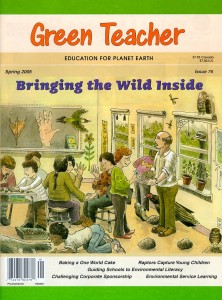Green Teacher 76, Spring 2005
 Features
Features
What if Teaching Went Wild? by Anthony Weston
Even indoors, it is still possible to unsettle the modern world’s deeply-felt sense of disconnection from the natural environment. Anthony Weston suggests a series of everyday and practical strategies for teachers to encourage their students to “go wild,” even in the conventional classroom setting.
Environmental Service-learning Projects: Developing Skills for Action by Lynn Dominguez and James McDonald
Service-learning is a teaching and learning method that connects meaningful community service with academic learning, personal growth and civic responsibility. Participation in environmental service-learning projects helps students hone their leadership skills, bolster their self-esteem, learn about environmental issues, and have an impact in their community. This article describes the Action Team Project, a service-learning model designed to assist teachers in using service-learning pedagogy to help their students develop skills for taking action on local issues.
There is No “Away”: Learning from Ecosystems about Sustainable Waste Management by Amanda Tetrault and Christina McDonald
This article describes a month-long inquiry-based unit for middle school students that is designed to help students conceptualize how much waste they produce, where it goes, how it is cycled in the system, and how to get rid of it. Like many similar units, students sort lunchroom garbage, observe the effects of waste incineration, and visit a local landfill. What is unique is that they spend time in natural settings observing how nature disposes of “wastes”. Later they visit local businesses and develop waste minimization plans for those companies. Along the way, they think a lot about sustainability.
First Flight with Raptors by Gail Hall
Birds of prey are fascinating “hooks” for teaching basic biology concepts and arousing the interest of young student in the natural world. This article presents several inquiry-based teaching activities that introduce kindergarten students to basic biology concepts, using birds of prey as an engaging focus for learning.
Challenging Corporate Sponsorship in Schools by Jessica Lax and Jocelyn Land-Murphy
Corporate funding of public schools often comes with strings attached, such as soft-drink contracts that require schools to meet sales quotas, educational materials that support the corporate sponsor’s viewpoint, or the exchange of cash for a captive audience for advertising. Addressing this important subject, the authors suggest activities that can be undertaken in many subject areas to investigate the impact of corporate sponsorship and advertising in schools.
Guiding Your School Toward Environmental Literacy by Jeff Reading
Jeff Reading guides teachers, students, and their families to become knowledgeable, concerned, and empowered individuals who understand their personal impact on the Earth and actively seek ways to maintain or improve the health of the planet. This five-step environmental literacy program has been practiced for 10 years in schools in Calgary, Alberta.
The World in a Cake by Jackie Kirk and Mary Gale Smith
This simple and adaptable recipe provides a tasty focal point for exploring how our food links us to people and places around the world
And as always, over 20 new educational resources are profiled and evaluated in this issue of Green Teacher.
Leave a Reply
You must be logged in to post a comment.





